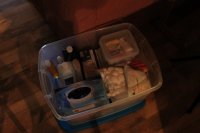BarredBuff
El Presidente de Pollo
After many months of thinking and pondering I finally decided to put together a comprehensive homestead medical kit today. I have wanted to for quite a while, but just never got around to do it. I don't have pictures right now because the kit is being used a different place tonight and tomorrow for out Youth Group campout. I can't imagine being out in the boone docks without a comprehensive kit.
My kit is fairly large, and I don't consider it nearly complete yet. I have a large rubbermaid container to hold all the supplies in. Then I have two narrow snap container about 3 inches deep, and two square containers about 4 inches deep. It order for it to be effective it must be well-organized.
I purchased most of the things are generic brands because they have to work the same in order to even be marketed. It is a lot cheaper, and can be rotated easier too. Tablet medicines will hold shelf life longer than liquids. I'm not an expert on shelf life, but it seems to hold up fairly well. I bought almost all of this for $150 dollars at the Dollar General.
It contains the following:
Tools
*Scissors
*Tweezers
*Safety Pins
*Finger nail clippers
*Thermometer
*Straight pins
*Q-Tips
*Cotton Balls
Antiseptics
*Peroxide
*Rubbing alcohol
*Alcohol in spray bottle
*Antibacterial Soap
*Baby Wipes
*Hand Sanitizers
Allergy/Cold/Flu
*One bottle of Antihistamine (Benadryl)
*Nasal Decongestant
*Sinus Relief
*Flu & Cold Medicine
*Nyquil
*Throat Lozenges
*Throat Spray
*Vick's Vaporub
*Cough Drops
*Sinus Nasal Spray
*Aspirin
*Acetaminophen
*Ibuprofen
Stomach
*Pepto Bismol (liquid and tablet)
*Antacid tablets
*Laxative tablets
Bandage
*Miscellaneous sizes of band-aids
*25 gauze pads (for cleaning and bandaging)
*Ace bandages
*Cloth tape
*Clear tape
*Athletic tape
*Gauze wrapping
I feel like I came back with more than that though.
Ointments and Creams
*Neosporin
*Calamine Lotion
*Anti Itch Cream
*Generic Aspercreme
*Burn Ointment
*Blistex
*Muscle Cream
*Petroleum Jelly
*Poison Ivy and Oak Wash
Miscellaneous
*Hot/Cold Clay Pack
*Knee Brace
*Wrist Brace
*Finger Splint
*Eye Wash
*Eye Drops
*Snake Bite Kit
*Swimmer's Ear Drops
I don't believe this kit is complete, however. I am missing a few different things.
THIS KIT SHOULD ALSO INCLUDE:
*One pint of whiskey
*One pint of honey
*Herbal teas
*Peppermint Candy
*Aloe Vera Gel
*Radiation tablets
*Paper towels
*Garbage bags
*Face masks
*Minor Surgery Kit
*An abundance of gauze and bandages
*Dental first aid supplies
*Instant cold compress
*Suturing kit
*Prescription Medicines that you need
*Stethoscope to monitor vital signs
*Antifungal medicines
*Syringes and needles
*Injectable epinephrine
*Injectable antibiotics
*Injectable antihistamine
*Home Remedy Book
*Ear ache drops
*Electrolytes
*First Aid Manual plus a binder compiled of how to's
*You should also stock plenty of this in your homestead storage.
I plan to try to take a few first aid classes including CPR. The things the kit needs also requires more basic medical experience. However, I imagine it should be able to take care of most major problems when it is completed.
My kit is fairly large, and I don't consider it nearly complete yet. I have a large rubbermaid container to hold all the supplies in. Then I have two narrow snap container about 3 inches deep, and two square containers about 4 inches deep. It order for it to be effective it must be well-organized.
I purchased most of the things are generic brands because they have to work the same in order to even be marketed. It is a lot cheaper, and can be rotated easier too. Tablet medicines will hold shelf life longer than liquids. I'm not an expert on shelf life, but it seems to hold up fairly well. I bought almost all of this for $150 dollars at the Dollar General.
It contains the following:
Tools
*Scissors
*Tweezers
*Safety Pins
*Finger nail clippers
*Thermometer
*Straight pins
*Q-Tips
*Cotton Balls
Antiseptics
*Peroxide
*Rubbing alcohol
*Alcohol in spray bottle
*Antibacterial Soap
*Baby Wipes
*Hand Sanitizers
Allergy/Cold/Flu
*One bottle of Antihistamine (Benadryl)
*Nasal Decongestant
*Sinus Relief
*Flu & Cold Medicine
*Nyquil
*Throat Lozenges
*Throat Spray
*Vick's Vaporub
*Cough Drops
*Sinus Nasal Spray
*Aspirin
*Acetaminophen
*Ibuprofen
Stomach
*Pepto Bismol (liquid and tablet)
*Antacid tablets
*Laxative tablets
Bandage
*Miscellaneous sizes of band-aids
*25 gauze pads (for cleaning and bandaging)
*Ace bandages
*Cloth tape
*Clear tape
*Athletic tape
*Gauze wrapping
I feel like I came back with more than that though.
Ointments and Creams
*Neosporin
*Calamine Lotion
*Anti Itch Cream
*Generic Aspercreme
*Burn Ointment
*Blistex
*Muscle Cream
*Petroleum Jelly
*Poison Ivy and Oak Wash
Miscellaneous
*Hot/Cold Clay Pack
*Knee Brace
*Wrist Brace
*Finger Splint
*Eye Wash
*Eye Drops
*Snake Bite Kit
*Swimmer's Ear Drops
I don't believe this kit is complete, however. I am missing a few different things.
THIS KIT SHOULD ALSO INCLUDE:
*One pint of whiskey
*One pint of honey
*Herbal teas
*Peppermint Candy
*Aloe Vera Gel
*Radiation tablets
*Paper towels
*Garbage bags
*Face masks
*Minor Surgery Kit
*An abundance of gauze and bandages
*Dental first aid supplies
*Instant cold compress
*Suturing kit
*Prescription Medicines that you need
*Stethoscope to monitor vital signs
*Antifungal medicines
*Syringes and needles
*Injectable epinephrine
*Injectable antibiotics
*Injectable antihistamine
*Home Remedy Book
*Ear ache drops
*Electrolytes
*First Aid Manual plus a binder compiled of how to's
*You should also stock plenty of this in your homestead storage.
I plan to try to take a few first aid classes including CPR. The things the kit needs also requires more basic medical experience. However, I imagine it should be able to take care of most major problems when it is completed.

